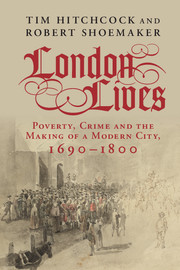Book contents
- Frontmatter
- Dedication
- Contents
- List of figures
- Preface
- Acknowledgements
- List of abbreviations
- 1 Introduction
- 2 Beggarman, thief: 1690–1713
- 3 Protest and resistance: 1713–1731
- 4 Vestries, justices and their opponents: 1731–1748
- 5 Reformers and their discontents: 1748–1763
- 6 Finding a voice: 1763–1776
- 7 The state in chaos: 1776–1789
- 8 Epilogue: The 1790s
- Bibliography
- Index
- References
4 - Vestries, justices and their opponents: 1731–1748
Published online by Cambridge University Press: 05 December 2015
- Frontmatter
- Dedication
- Contents
- List of figures
- Preface
- Acknowledgements
- List of abbreviations
- 1 Introduction
- 2 Beggarman, thief: 1690–1713
- 3 Protest and resistance: 1713–1731
- 4 Vestries, justices and their opponents: 1731–1748
- 5 Reformers and their discontents: 1748–1763
- 6 Finding a voice: 1763–1776
- 7 The state in chaos: 1776–1789
- 8 Epilogue: The 1790s
- Bibliography
- Index
- References
Summary
Introduction
When she stood trial at the Old Bailey for the theft of six pewter plates and an iron bedscrew (used to fasten bedframes together) in October 1736, Grace Powell must have seemed the embodiment of a disorderly Londoner. Recently discharged from St Martin’s workhouse, penniless, recently widowed, drunk and having apparently abandoned her only child, she sought temporary refuge at Samuel Pate’s ‘stand’, or low lodging house in St Giles in the Fields, where for tuppence a night, he ‘entertains Black-shoe-fellows, and sells Drams … the House … full of People, Men and Women, all lie[ing] together in the same Room’. The worse for wear after drinking three or four drams of Pate’s gin, Powell was caught with the iron bedscrew secreted in her petticoats, and when she attempted to escape down the back stairs to the cellar, Martha King watched as Powell ‘dropp’d two Plates upon the Stairs, I saw her pull two more out of her Bosom, and two more she dropped down the Vault’. Despite the clanging pewter, and artfully hidden bedscrew, Grace Powell was acquitted by a sympathetic jury clearly willing to condone at least some types of disorder. They found her not guilty, following a simple plea that she had no ‘Friends but God and my self’. Grace was just one of the 3,805 defendants found not guilty at the Old Bailey in this eighteen-year period, bookmarked by years in which the acquittal rate was over 40 per cent.
With one exceptional year, the 1730s and 1740s were characterised by relative calm and prosperity. The decade after 1729, in particular, witnessed a sustained series of good harvests driven by a unique series of mild winters and warm summers, resulting in high real wages. Acquittal rates at the Old Bailey rose, while prosecutions and committals to Bridewell both slid gradually downward. Marginally fewer convicts were hanged or transported. Following the outbreak of war with Spain in 1739, the years between 1740 and 1748 also saw relatively good conditions. Many young men were drawn into the military, while prices and wages remained steady.
- Type
- Chapter
- Information
- London LivesPoverty, Crime and the Making of a Modern City, 1690–1800, pp. 136 - 193Publisher: Cambridge University PressPrint publication year: 2015



